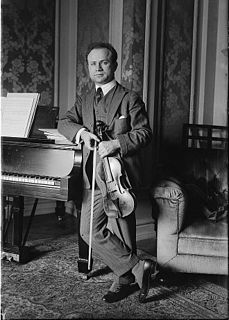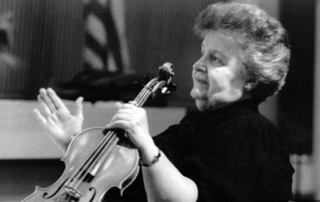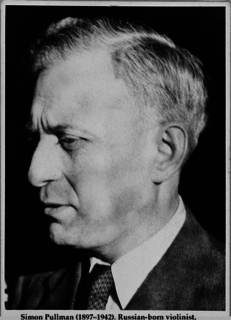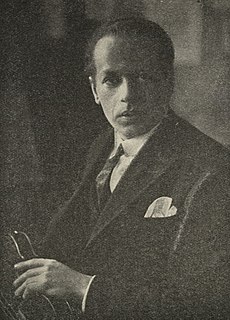Julius Baker was one of the foremost American orchestral flute players. During the course of five decades he concertized with several of America's premier orchestral ensembles including the Chicago Symphony and the New York Philharmonic Orchestra.
Osvaldo Noé Golijov is an Argentine composer of classical music and music professor, known for his vocal and orchestral work.

Mischa Elman was a Russian-born Jewish-American violinist, famed for his passionate style, beautiful tone, and impeccable artistry and musicality.

Dorothy DeLay was an American violin instructor, primarily at the Juilliard School, Sarah Lawrence College, and the University of Cincinnati.

Mieczysław Horszowski was a Polish-American pianist who had one of the longest careers in the history of the performing arts.

Robert Nathaniel Mann was a violinist, composer, conductor, and founding member of the Juilliard String Quartet, as well as a faculty member at the Manhattan School of Music. Mann, the first violinist at Juilliard, served on the school's string quartet for over fifty years until his retirement in 1997.

Simon Pullman was a violinist, conductor, music teacher and founder and Director of the Pullman Ensemble and Orchestra, and a seminal figure in the evolution of chamber music performance.
Eleanor Aller (Slatkin) was an American cellist and founding member, with her husband, Felix Slatkin, of the Hollywood String Quartet.
Richard Aberman Nanes was an American businessman, and amateur composer and pianist.

Franz Kneisel was an American violinist and teacher of Romanian birth.

Abraham Alexander Schneider was a violinist, conductor and educator. Born to a Lithuanian Jewish family in Vilnius, Lithuania, he later moved to the United States as a member of the Budapest String Quartet.
Erich Gruenberg was an Austrian-born British violinist and teacher. Following studies in Israel, he was a principal violinist of major orchestras, including the Royal Stockholm Philharmonic Orchestra, the London Symphony Orchestra and the Royal Philharmonic Orchestra. He was an international soloist, playing the first performance of Britten's Violin Concerto in Moscow. As a chamber musician, he was leader of the London String Quartet and recorded all Beethoven violin sonatas with pianist David Wilde. He was the lead violinist for The Beatles' album, Sgt. Pepper's Lonely Hearts Club Band. Gruenberg taught at the Royal Academy of Music until age 95, influencing generations of violinists.

Stephen Clapp was a violinist and Dean Emeritus of the Juilliard School.
Raphael Hillyer was an American viola soloist, teacher. Born Raphael Silverman in Ithaca, New York, his career included playing in the Boston Symphony Orchestra and co-founding the Juilliard String Quartet. Hillyer was still lecturing and teaching viola at Boston University during the final month of his life.

Samuel Gardner was an American composer and violinist of Russian Jewish origin. He won a Pulitzer prize with a string quartet in 1918. He was a student of Franz Kneisel and Percy Goetschius, and began his career as a concert violinist; among his compositions is a violin concerto. He wrote a number of other chamber works, and a handful of things for orchestra, including Broadway, which was performed by the Boston Symphony in the 1929-30 season.

Edgar Ortenberg was a violinist in the Budapest String Quartet and taught violin at the Settlement Music School and Temple University in Philadelphia, Pennsylvania.
Michael Guttman is a violinist, chamber musician, conductor and festival director. He is the brother of actor Ronald Guttman. He plays a 1735 Guarneri violin.
Thomas Daniel Nyfenger was an American flutist and teacher known for his "intense and caring emotion for the flute" and described as “a thorough professional who programs interesting music and is not above having a good time while playing it.” He taught at the Yale School of Music, played piccolo for the Indianapolis Symphony Orchestra, and held many part-time playing and teaching positions throughout his career.

Hugo Gottesmann was an Austrian violinist, violist, conductor, and chamber musician and a highly decorated soldier in World War I. His career in Vienna as a conductor and violinist was cut short when Hitler took office in Germany in 1933. He was fired from his positions at Radio Wien, the Vienna Symphony, and the Academie für Musik and forced to seek work elsewhere in Europe and emigrate to the United States.
Ken Noda is an American concert pianist, accompanist, vocal coach, and composer. He began composing music and performing as a concert pianist before the age of 11. He has performed with symphony orchestras throughout the world, and has composed numerous art songs and five operas. He worked as a vocal coach at the Metropolitan Opera from 1991 until retiring from his full time position in July 2019.










